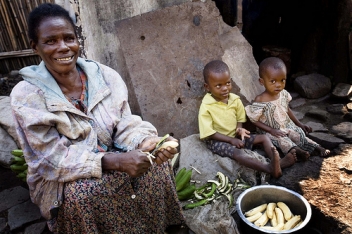 As the world population reaches seven billion today, we must remember that this is not just about a world belonging to younger generations. The world does not solely belong to the young.
As the world population reaches seven billion today, we must remember that this is not just about a world belonging to younger generations. The world does not solely belong to the young.
As more of us live longer, this great success story of the modern world will only remain a success if we can guarantee a healthy and dignified old age for future generations.
That is why we at HelpAge are today applauding the United Nations Population Fund, (State of the World Population, 2011) for dispelling harmful myths about ageing.
The report demonstrates that global ageing is rising across both high and low income countries, celebrates the contribution older people make to the world’s economy and how ensuring regular income and good health for the present 893 million, but also future 2.4 billion older people, is critical for a secure future of all generations.
We must do more for older people in poverty
However, we must do more to meet the challenges of a century that is growing old.
Protecting the health and productivity of the world’s older people now, is the only way to ease the challenges we all face from an ageing world.
It is not just gender and geography that drives inequality, a widening gap between young and old is also a barrier to mutually beneficial progress.
Of the world’s seven billion people, 893 million are over 60 worldwide, with the majority of older people living in developing countries.
By the middle of the 21st century that number will rise to 2.4 billion. Presently, millions of older people are reaching old age in poverty and ill health.
In the developing world, we estimate more than 180 million older people live in poverty. In contrast, their rights and needs are still being ignored by policy makers, despite the invaluable support older people give either by supporting their children and grandchildren in humanitarian disasters, taking on responsibility when parents have migrated or acting as carers for family too sick to work or attend school.
80% of the world’s population is not sufficiently protected in old age against health, disability, income risks and poverty, with only one fifth having access to a pension.
Family support for older people is weakening under the pressures of higher poverty, migration and rising food prices. This growing lack of reliable income means that older people in developing countries often have no choice but to work into old age. With the majority working in an informal setting or subsistence agriculture they have no savings or a pension and work long hours for low pay, in insecure and dangerous jobs.
Investing in older generations now
Our ageing population is a triumph of development and is happening in some of the poorest countries. But older people must not be sidelined and tackling the support we build now is a key to the future. Investing in secure pension and health reforms will help generations that already rely on each other. We cannot delay any longer, as more people are born, more will age and we must be ready.
Our hope following this landmark look at our population, is that it will be a wake up call to many as to how much older men and women contribute to society and that we must absorb their knowledge and experience in building robust responses to an ageing population.
It is time to rethink attitudes to ageing.
We are already supporting monitoring projects in 15 countries, where groups of older people hold their governments to account for commitments they have made.
We will also keep tirelessly pressing for ageing to be included in key international processes; including the Millennium Development Goals, European Union policies and funding priorities.
What next?
- Visit our website for more ageing statistics
- Read more on older people’s rights
- Keep up to date with HelpAge’s work by signing up to the HelpAge e-newsletter
- Follow us on Facebook or Twitter
